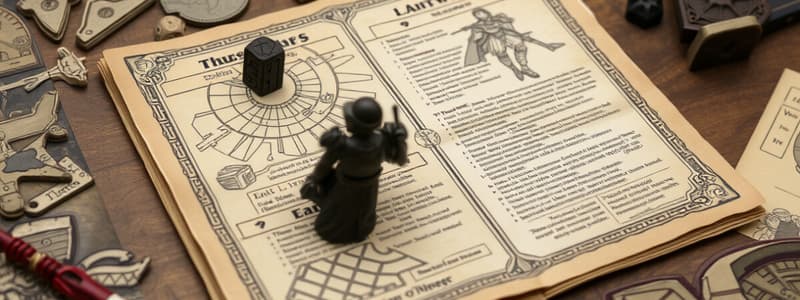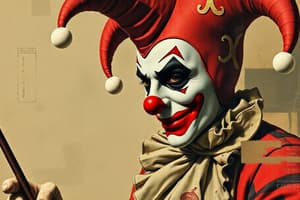Podcast
Questions and Answers
Why aren't we having D&D this week? (Choose One)
Why aren't we having D&D this week? (Choose One)
- Crony Capitalism (correct)
- The Military-Industrial Complex
- Academia
- All of the above
Which edition of D&D introduced the d20 System?
Which edition of D&D introduced the d20 System?
- 3rd Edition (correct)
- 4th Edition
- 2nd Edition
- 1st Edition
What are the two main components players must choose when creating a character in D&D?
What are the two main components players must choose when creating a character in D&D?
- Background and Abilities
- Weapons and Armor
- Race and Class (correct)
- Skills and Equipment
In what year was the first edition of Dungeons & Dragons published?
In what year was the first edition of Dungeons & Dragons published?
How do players resolve combat actions in Dungeons & Dragons?
How do players resolve combat actions in Dungeons & Dragons?
What is the function of initiative in D&D's turn-based combat system?
What is the function of initiative in D&D's turn-based combat system?
Which of the following is a common high-fantasy setting in D&D?
Which of the following is a common high-fantasy setting in D&D?
What do characters gain from completing quests and defeating enemies in D&D?
What do characters gain from completing quests and defeating enemies in D&D?
Flashcards are hidden until you start studying
Study Notes
Overview of Dungeons & Dragons (D&D)
- D&D is a tabletop role-playing game (RPG) created by Gary Gygax and Dave Arneson, first published in 1974.
- Players create characters and embark on adventures in a fantasy setting, guided by a Dungeon Master (DM).
Core Components
-
Players and Characters
- Players assume the role of characters with distinct traits, abilities, and backgrounds.
- Character creation involves choosing a race (e.g., human, elf) and class (e.g., wizard, fighter).
-
Dungeon Master (DM)
- The DM serves as the game's referee and storyteller.
- Responsible for world-building, narrative flow, and adjudicating rules.
-
Dice
- Various polyhedral dice are used to determine outcomes (e.g., D20 for actions).
- Dice rolls are central to gameplay mechanics.
Gameplay Mechanics
-
Turn-Based System
- Players take turns during encounters, allowing for strategic decision-making.
-
Combat
- Involves rolling dice to attack, defend, and resolve damage.
- Initiative determines the order of actions in combat.
-
Skill Checks
- Players roll dice to determine success or failure in actions (e.g., sneaking, persuading).
-
Leveling Up
- Characters gain experience points (XP) for completing quests and defeating enemies, allowing them to level up and improve abilities.
Game Editions
- D&D has undergone several editions, each refining rules and gameplay:
- 1st Edition (1974): Laid foundational rules.
- 2nd Edition (1989): Expanded lore and options.
- 3rd Edition (2000): Introduced the d20 System, focusing on a unified mechanic.
- 4th Edition (2008): Emphasized tactical combat and character roles.
- 5th Edition (2014): Streamlined rules, increased accessibility, and focused on storytelling.
Setting and Lore
- D&D features diverse worlds, commonly including:
- Forgotten Realms: A high-fantasy setting with rich lore.
- Eberron: A blend of magic and technology.
- Greyhawk: One of the earliest campaign settings.
Classes and Races
- Classes: Examples include Fighter, Wizard, Cleric, Rogue, Bard.
- Races: Common options include Human, Elf, Dwarf, Halfling, Dragonborn.
Role of Imagination
- D&D emphasizes creativity and narrative collaboration.
- Players and the DM build the story together through character decisions and interactions.
Cultural Impact
- D&D has influenced various media, including video games, literature, and films.
- The game fosters community, collaboration, and critical thinking skills.
Conclusion
- Dungeons & Dragons is a dynamic and immersive game that combines storytelling, strategy, and imagination, making it a cornerstone of tabletop gaming culture.
Overview of Dungeons & Dragons (D&D)
- A tabletop role-playing game (RPG) created by Gary Gygax and Dave Arneson, first published in 1974.
- Players create fantasy characters and undertake adventures, with guidance from a Dungeon Master (DM).
Core Components
- Players and Characters
- Players assume distinct characters with unique traits and abilities.
- Character creation involves selecting a race (e.g., human, elf) and class (e.g., wizard, fighter).
- Dungeon Master (DM)
- Holds the role of referee and storyteller, managing world-building, narrative, and rules.
- Dice
- Utilizes polyhedral dice, such as the D20, to determine game outcomes.
- Dice rolls are a fundamental aspect of gameplay mechanics.
Gameplay Mechanics
- Turn-Based System
- Players act in turns during encounters, enabling strategic choices.
- Combat
- Players roll dice to perform attacks, defend themselves, and manage damage.
- Initiative roll dictates the order of actions in combat scenarios.
- Skill Checks
- Dice rolling is utilized to assess the success of various actions (e.g., sneaking or persuading).
- Leveling Up
- Characters earn experience points (XP) by completing quests and defeating foes, allowing progression and enhancement of skills.
Game Editions
- D&D has evolved through multiple editions, each refining rules and gameplay:
- 1st Edition (1974): Established core rules.
- 2nd Edition (1989): Expanded lore and game options.
- 3rd Edition (2000): Introduced the d20 system for a unified gameplay mechanic.
- 4th Edition (2008): Focused on tactical combat and defined character roles.
- 5th Edition (2014): Streamlined rules for accessibility and emphasized storytelling.
Setting and Lore
- Features various worlds:
- Forgotten Realms: A rich, high-fantasy environment.
- Eberron: Combines magical elements with technology.
- Greyhawk: One of the earliest and most influential campaign settings.
Classes and Races
- Classes: Include Fighter, Wizard, Cleric, Rogue, Bard.
- Races: Options include Human, Elf, Dwarf, Halfling, Dragonborn.
Role of Imagination
- Creativity and collaborative narrative are central to D&D.
- Players and DM co-create the storyline through interactions and decisions.
Cultural Impact
- D&D has significantly influenced other media, including video games, literature, and film.
- Encourages community engagement, collaboration, and critical thinking skills.
Conclusion
- Dungeons & Dragons blends storytelling, strategy, and creativity, solidifying its status as a foundational part of tabletop gaming culture.
Studying That Suits You
Use AI to generate personalized quizzes and flashcards to suit your learning preferences.




